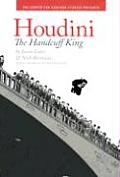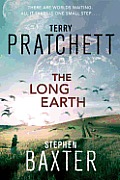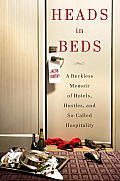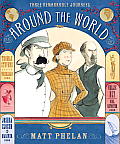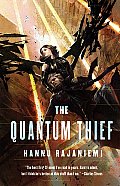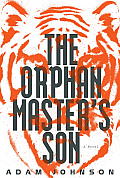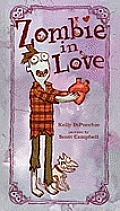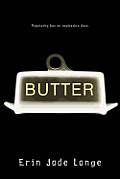Link to this review in the form of a comic strip by geneambaum tagged biography • graphic novel
Link to this review by billba tagged science fiction
A set of simple instructions spreads virally on the Internet. Follow them to make a simple box with a single switch. Flick it and you “step” into an alternate Earth just like ours, but without humans. You can keep stepping to different Earths. The only limitation is that any iron products you have will be left behind. Oh, and you will probably lose your lunch.
Why I picked it up: I’m a sucker for parallel world novels, and I’ve enjoyed every Terry Pratchett book I’ve ever read.
Why I finished it: Vignettes from the inter-dimensional pioneer movement (blacksmiths suddenly become very hot commodities) contrast nicely with the adventures of Joshua Valienté, a man who can step without assistance (and without getting sick).
I’d give it to: Ray, who did this great Unshelved Book Club strip. This is very much not a Discworld novel, but he’ll like the moments of humor between Joshua and his companion, Lobsang, a rich and powerful artificial intelligence who claims to be the reincarnation of a Tibetan motorcycle repairman.
Link to this review by flemtastic tagged humor • nonfiction
Jacob Tomsky’s degree in philosophy wasn’t doing anything for his job prospects, so he began parking cars as a hotel valet. He worked his way to the heart of the hotel, managing a 150 person room cleaner and service personnel department. His work ethic and willingness to work long hours helped him to move on to the big leagues at a high-end hotel in New York.
Although the names have been changed to protect the not-so-innocent, Tomsky details the hilarious and sometimes disgusting exploits of the hotel workers, their job descriptions (which are often in stark contrast to what they actually do), and the ways they make extra money on the job by providing perks to customers or committing unnoticed petty theft.
The book ends with a section of advice for hotel guests, including questions a customer should never ask, how to behave around hotel staff, and ways to get what one wants during a stay.
Why I picked it up: I want to know what is going on behind the scenes at the hotels I stay at, especially when I don’t tip properly or accidentally tick some worker off.
Why I finished it: Jacob is a sharp, smart, sarcastic guy. He recounts sabotaging the rooms and vacations of people who verbally abused a doorman, told a racist joke, and treated their family members poorly. One particular way to get revenge was the “key bomb,” which involved giving the offending customer a set of keys at check-in that reset the hotel door each time they were used. The person would have to make tons of trips down to the hotel lobby to get a new key because although it worked once, it never did again. Also, I learned about the clever ballet between the front desk and the bellman that involved passing on the customer in such a fashion that tips become more likely for the bellman, which makes for more kickbacks to the front desk. There are all the prurient parts you would expect from a hotel tell-all: staff accidentally walking in on lovers, high-priced call girls, staff emptying minibar fridges, and finding used condoms in the laundry.
I’d give it to: My friend Mark, a frequent traveler. He doesn’t frequent high-end hotels like this, but he would appreciate knowing how infrequently the bedspreads are washed, and the top ten things you should never say to a hotel desk person, on pain of a bellman urinating into your cologne bottle.
Link to this review by geneambaum tagged graphic novel • history • nonfiction
Three tales of real people who, inspired by Jules Verne’s Around the World in Eighty Days, circumnavigated the globe.
In 1885, Thomas Stevens, a miner, taught himself to ride a bicycle in order to ride across the U.S. and become famous. He set off to ride around the world.
In 1889 Nellie Bly set off to beat Verne’s Phileas Fogg at his own game and circle the globe. But first she had to convince the men at the New York World that a woman, alone and unchaperoned, could make such a journey.
Retired Captain Joshua Slocum repaired a small sailboat, Spray. In 1895 he set off alone to sail it around the world.
Why I picked it up: I loved Phelan’s first graphic novel, The Storm in the Barn, and I also wanted to know more about Nellie Bly because she’s mentioned in Carole Estby Dagg’s The Year We Were Famous.
Why I finished it: The unexpected details. Stevens’s bike looked ridiculous and unridable, with its giant front wheel and tiny rear wheel. Bly’s editors created news about her trip when there was none, and even merchandised her to make more money. (There’s also the magical moment where she met Jules Verne in France.) And throughout his journey Slocum is haunted by visions of his deceased first wife and their life together. (Phelan’s art shines throughout, but these images in Slocum’s story are quiet and heartbreaking.)
I’d give it to: My mother’s ex-husband Bill, a sailor who would love Slocum’s story, and would be astonished at the number of times he simply tied the wheel, ignored the ocean, and read in his cabin.
Link to this review by dawnrutherford tagged science fiction
Master thief Jean le Flambeur is trapped in an advanced space prison where his consciousness has been transferred into a computer. Inside, he constantly is forced into a prisoner’s dilemma against other captives. His every action is watched. He must cooperate or be shot. Supposedly, being “killed” thousands of times will rehabilitate him.
Then a miracle happens. Jean is rescued. An alien named Mieli and her amazing ship are being blackmailed. They need him to perform an incredibly complicated job. But first they must find where he has hidden his memories.
Why I picked it up: My science fiction book group selected this title, and I loved the idea of a science fiction heist.
Why I finished it: I can’t even pretend to understand the physics behind the book’s science, but the characters sucked me in. I loved them all: the spacecraft’s flirtatious AI, the Martian boy-detective, and all of Jean’s lost friends and lovers.
I’d give it to: John, who has a passion for physics and might be able to explain the science a bit, and who would appreciate all the kick-ass fight scenes.
Link to this review by silver tagged literary
Jun Do grew up in the North Korean orphanage his father ran. Because he was the son of the orphan master, he acted as a kind of manager even though he was young. The quick decision-making and survival skills he developed there gave him unusual opportunities.
As an adult, Jun Do worked as a North Korean agent. He kidnapped Japanese citizens from isolated beaches in Japan. Then he worked on a fishing boat where he slept during the day, but stayed awake at night to monitor radio transmissions for American, South Korean, and Japanese conspiracies.
Because he learned English, he was sent to Texas where the U.S. recruits him as a spy. Jun Do tried to use his relationship with the American government to save the woman he loved.
Why I picked it up: When I was an elementary school student in South Korea, I was taught that North Koreans were red-faced monsters with a yellow horn in the middle of their foreheads. But my dad was from North Korea (he fled south as the communists invaded from China), so I realized North Koreans were human like me. I became very interested in their lives, especially how they survived those harsh winter days with almost no modern technology. (My dad told me how his pee froze halfway to the ground.)
Why I finished it: Every morning North Koreans are awakened by government messages from the loudspeakers installed in every house. This propaganda seemed very real to me. My brother was stationed in the Korean DMZ when he served in the South Korean army. He used to come home during his vacation and tell us what he heard through the loud speakers directed at the soldiers by the North. (This passage from the book that reminded me of what he told us.)
Here comes the world news. Naked aggression continues from America — currently, two nuclear attack groups are parked in the East Sea, while in the U.S. Mainland homeless citizens lie urine-soaked in the streets. And in poor South Korea, our soiled little sister, there is more flooding and hunger. Don’t worry, help is on the way — Dear Leader Kim Jong Il has ordered that sandbags and food shipments be sent south right away.
I’d give it to: Genevieve, who always supports my annual fundraiser for the Citizens’ Alliance for North Korean Human Rights because she wonders how the North Korean government can sustain its grip on people for so long despite a lack of money and resources. She’ll be heartbroken to read about the cruelty used to guarantee the government’s survival.
Link to this review by sarahhunt tagged picture book
Undead (but charming) Mortimer can’t find a date for the Cupid’s Ball, even though he offers gifts to the ladies he meets and follows the advice in dating books. Can a last-ditch newspaper ad help him find love?
Why I picked it up: I’m a fan of the illustrator, Scott C., plus I love a good zombie picture book!
Why I finished it: Mortimer tries hard to do the right thing, but people just keep judging him on his looks! He also has a delightful undead dog and adorable worms for friends.
I’d give it to: Lawrence, who would like the joke based on “Escape (The Pina Colada Song).”
Link to this review by flemtastic tagged coming of age
Butter got his nickname when several high school bullies forced him to eat a stick of butter because of his size. However, when you weigh 423 pounds in high school, your nickname, even if you hate it, is the least of your worries.
Butter looks forward to his time playing the saxophone, his mother’s attention, and his buddy Tucker (a fellow summer fat camper). As Saxman, he also has an online-only friend, Anna, who doesn’t know who he really is or that they’re in class together every day, though they flirt and have deep conversations via chat every night.
After he creates a joke website claiming that he will eat himself to death, online, live, on New Year’s Day, he gets a huge amount of attention at school. He’s surprised how much he likes it. New Year’s Day is also the day he is supposed to meet up with Anna in person.
Butter doesn’t really doesn’t want to go through with his suicide, but how can he live with everyone’s disappointment if he doesn’t follow through?
Why I picked it up: Alienation is a popular topic among the middle school readers at my school library. I thought the bullying and online component in this book would add to its appeal.
Why I finished it: Lange does a credible job getting inside Butter to show his daily life and feelings. Several embarrassing things happen to him daily, from growing short of breath hiking up from his handicapped spot in the school parking lot to using a specially-made, plus-sized desk in humanities class. Butter’s relationship with his mother is complex and subtly handled, too. Her enabling behavior is frequently at odds with her concern over his health; she takes him to the weight doctor after cooking him bacon, biscuits, and eggs. Butter’s online relationship with Anna really cranks up the suspense because he’s likable and I wanted him to succeed, yet I saw the train wreck coming.
I’d give it to: Jeff, a fan of Allen Zadoff’s Food, Girls and Other Things I Can’t Have, another funny book that captures the experience of going through high school overweight.
Link to this review by geneambaum tagged graphic novel • board book
A boy and a girl walk through a house looking at the secrets around them.
Why I picked it up: Crane’s graphic novel The Clouds Above was beautiful. But I would have picked this up anyway because 1) it’s a comic board book (there aren’t enough of them) and 2) it uses black ink that disappears when heated to reveal (to the reader) what the kids are seeing.
Why I finished it: My daughter and I had a great time reading this together in front of the fireplace during Seattle’s snowmageddon ’12. We’d read a page, hold it facing the heat for a few seconds, and then look at the revealed secrets. (Rubbing also works, though the cover says it works best with a hairdryer.) And the secrets are unexpected — on the first few pages there are coats filled with sleeping birds, medicine in a book, a briefcase full of leaves, a cat filled with mice, a woman who is really two people (one standing on the other’s shoulders) wearing a tall coat, a radio full of wasps and others.
I’d give it to: My wife, Silver, to watch her jump when the refrigerator door fades to reveal that it’s full of rats having a party. Silver hates rats.
